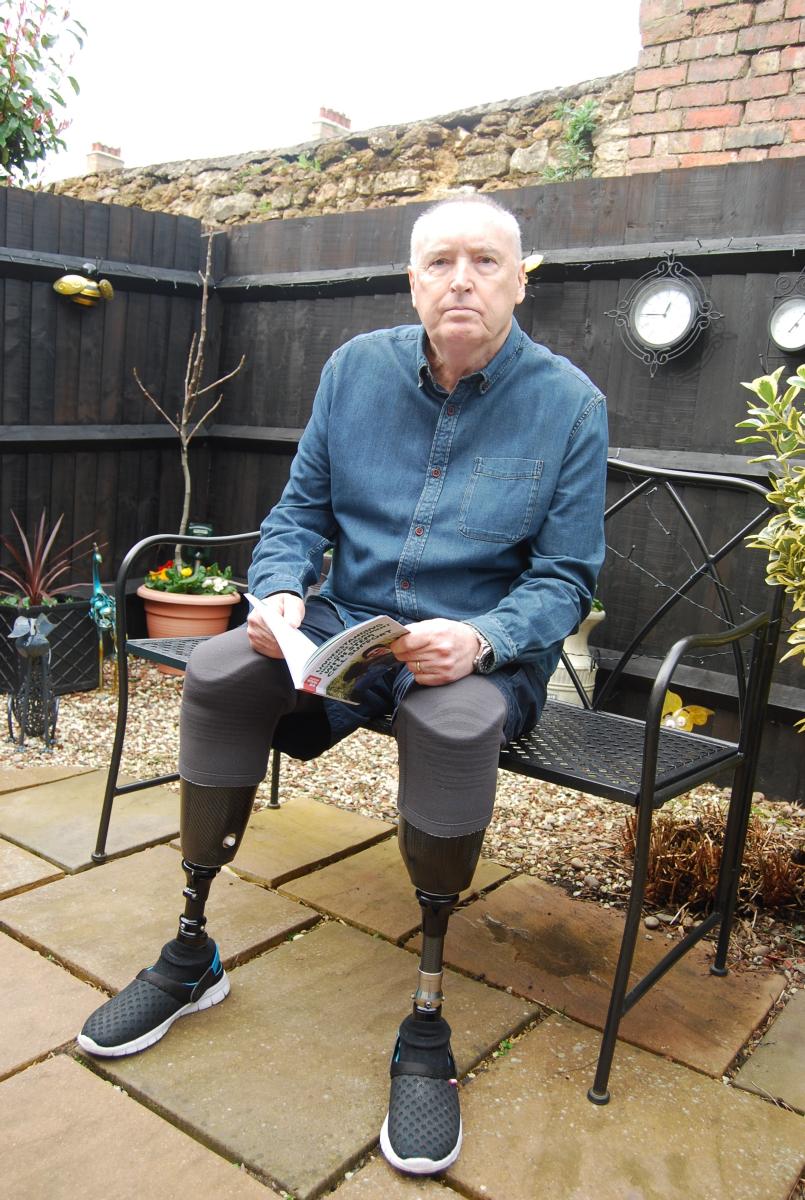KGH patient and team support awareness of myeloma

Father-of-two Dave Carson, 70, from Kettering, has teamed up with Myeloma UK this week (National Myeloma Awareness Week 20-26 June) to help prevent delayed diagnosis of the disease.
He is being supported by KGH hospital specialists who are asking all local medical professionals to look out for symptoms in their patients that could be myeloma - because only specialised myeloma specific tests can lead to its diagnosis.
A report by Myeloma UK shows that on average it takes 163 days to diagnose myeloma because initial symptoms can be subtle and mirror other conditions.
Anything over 90 days to diagnosis from GP or A&E visit is considered a delayed diagnosis and a quarter of patients wait more than a year to be diagnosed – some of the longest waits to any cancer diagnosis.
Delays to treatment mean the incurable disease can progress to cause significant pain, bone fractures, and kidney damage – reducing patients’ quality of life and shortening remaining life expectancy.
Dave Carson's story
Dave Carson was diagnosed with multiple myeloma on August 5, 2020, some 53 days after an initial A&E visit with chest pain and after a confirmatory bone marrow test.
His myeloma diagnosis was a second major blow for him after losing both of his legs and six fingertips to sepsis in 2013. Mr Carson fought back, learned to walk on prosthetic legs, and became a leading local volunteer for the UK Sepsis Trust.
He now wants to volunteer for Myeloma UK to support its campaign for more focus on the disease.
He said: “Because of my experience with sepsis I have to be very careful and when I had chest pain and felt breathless I went to A&E in case it was pneumonia.
“Nothing was found on my first visit but 18 days later I went back to A&E with more chest pain and further tests raised the suspicion of myeloma.
“Myeloma can be easily missed because some of the symptoms are vague and things like chest and back pain, and being out-of-breath, can have had other causes.
“I hope that my story helps raise awareness of myeloma and helps patients and medical professionals to be more aware of it so that people get treatment earlier and have a better quality of life.”
Mr Carson, a former coaching & mentoring consultant, added: “People say I’m a really resilient and positive person. Talking openly about how I’m feeling has helped me. It’s saved my mental health.
“Some days when I think about what’s happened it can be overwhelming. But I feel that I’ve come through the initial diagnosis and the ‘Why me?’. I just want to look forward. It’s difficult when there’s no cure but I want to raise awareness. I’m certain other people have not yet been diagnosed and they’re in trouble.”
KGH team support Dave in raising awareness
Cancer specialists at KGH are supporting greater awareness of myeloma amongst both the public and medical professionals.
KGH Consultant Haematologist, Dr Alex Gebreyes, said: “Multiple Myeloma can be difficult to detect as the symptoms can be subtle and may mimic many other common medical complaints such as tiredness and back pain.
“I would urge all medical professionals to be vigilant and consider myeloma when they see symptoms like unexplained fractures, anaemia, tiredness, weight loss, abnormal kidney function, or raised total protein or serum calcium in blood tests.
“It is important to be suspicious and initiate specialist tests. The sooner myeloma is diagnosed the better the quality of life for the patient can be because we can use initiate treatment which could minimise the damage the disease causes.”
Kathy Heywood is KGH’s Macmillan Lymphoma Clinical Nurse Specialist who supports Mr Carson and other patients with myeloma.
She said: “Dave is a tremendously brave man and we support his efforts to raise awareness about myeloma.
“Developing myeloma after having been so badly affected by sepsis is devastating and Dave was particularly concerned about his mobility because he walks on prosthetics.
“While many other conditions can look like myeloma it is important to take symptoms like fatigue, muscle and bone pain and unexpected fractures seriously and have them fully investigated.”
National charity thanks KGH for its support
Myeloma UK has thanked Dave Carson and KGH for their support during the national awareness week.
Myeloma UK’s Acting Director of Research and Patient Advocacy, Shelagh McKinlay, said: "We’re delighted that Dave Carson and Kettering General Hospital are supporting our campaign to raise awareness of myeloma and prevent people’s lives being diminished by avoidable delays in diagnosis.
“The quality of life of people living with myeloma has never been more important, with advances in treatment meaning that patients are now able to live longer than ever before.
“Delayed diagnosis is well known to increase the likelihood that patients will experience two or more serious complications. Yet, there are still no specific diagnosis targets to make sure the disease is caught and treated in time.”
